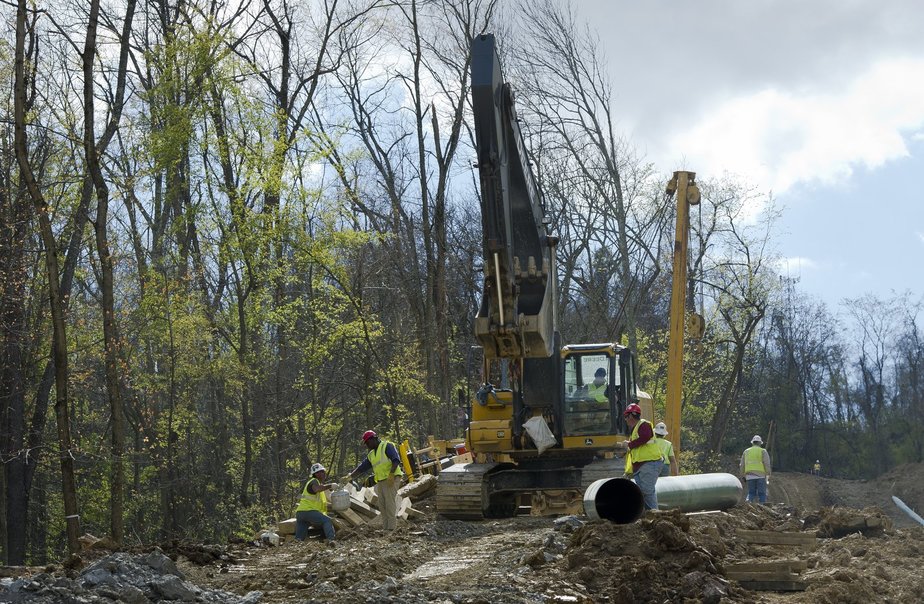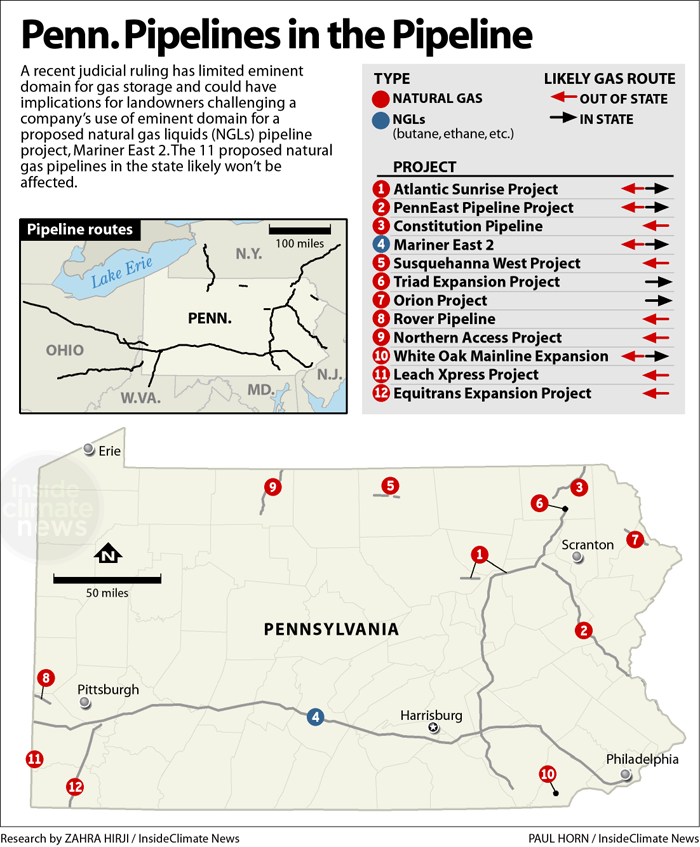
Pipelines in Pennsylvania, like this one being built outside Waynesville in 2012 to support the fracking boom, may face new hurdles because of a state Supreme Court ruling on eminent domain. Credit: AFP/Getty Images
The Pennsylvania Supreme Court has unanimously ruled unconstitutional a section of state law that lets companies seize private land for certain natural gas projects, with potentially major implications for one of the biggest proposed pipelines in the state.
Under the original rule, passed in 2012, any company has the authority to take private land through eminent domain for the purpose of storing natural gas underground.
The justices decided on Sept. 28 that this section of the law unconstitutionally lets private companies profit from taking people's land with no direct or obvious benefit to Pennsylvanians. The oil and gas companies argued the projects could benefit the state by creating new jobs, for example, but the justices were not convinced.
"The Commonwealth does not claim, nor can it do so reasonably, that the public is the 'primary and paramount' beneficiary when private property is taken in this manner," the justices wrote. "Instead, it advances the proposition that allowing such takings would somehow advance the development of infrastructure in the Commonwealth. Such a projected benefit is speculative, and, in any event, would be merely an incidental one and not the primary purpose for allowing these types of takings." The high court's decision reversed a lower court's ruling that upheld this part of the rule.
This decision is the latest victory for property rights owners and environmental activists who are increasingly challenging energy companies nationwide as they seek to use eminent domain for pipelines and other large infrastructure projects. Earlier this year, the Georgia legislature passed a bill that would have stalled construction on Kinder Morgan's Palmetto Pipeline until 2017 due to property rights concerns; before the bill was signed into law, the company suspended construction on the pipeline.
"Every time you have a win, it just adds to the case law," said Jane Kleeb, founder of the grassroots advocacy group Bold Nebraska, which led the successful opposition to the Keystone XL pipeline. "It adds hope for landowners."
Pennsylvania is the second-largest producer of natural gas and is in the middle of a pipeline boom to move much of the state's fracked gas and drilling byproducts to East Coast and international markets. Companies are proposing at least a dozen gas-related pipelines, many with plans to cross private land.

The recent decision dealt only with underground natural gas storage, but it could have repercussions for the way eminent domain is applied to one of the biggest proposed pipelines in the state: Sunoco Logistics' Mariner East 2 project.
The Mariner East 2 would carry natural gas liquids like butane, ethane and propane. They are byproducts of the drilling boom used for plastics, home heating, lighting fuel and more. When it comes to eminent domain, state regulators have jurisdiction over natural gas liquids pipelines, as they do with gas storage. The other 11 proposed pipelines would likely not be affected by this ruling because they ship natural gas, putting those pipelines' use of eminent domain under the purview of federal regulators.
The $2.5 billion Mariner East 2 project would secure Pennsylvania's position as an East Coast hub for natural gas liquids distribution. It's an expansion of Sunoco Logistics' Mariner East 1 pipeline, which sends propane across Pennsylvania and ethane to a terminal near Philadelphia for export to Europe. That original line runs about 300 miles, from eastern Pennsylvania to outside Philadelphia. If built, the new project would mostly follow a parallel route, but would start further east in Scio, Ohio, and it would have about four times the capacity of Mariner East 1.
The company faces many lawsuits by landowners over its use of eminent domain. And this new ruling could bolster the claims of the opponents.
"We have a unanimous court that just struck down, without blinking, eminent domain powers for oil and gas issues and the idea that there's some public purpose [for these projects] because we are creating jobs," said John Smith, one of the plaintiffs' lawyers. Regarding energy companies' future reliance on eminent domain, Smith added, "I'm sure there's a bit of nervousness."
Sunoco Logistics declined to comment on the recent court decision and its implications for Mariner East 2.
In Pennsylvania, land can only be taken through eminent domain if the project provides a so-called "public use." The project "must be for the primary and paramount benefit of the...Pennsylvania public," according to Alex Bomstein, a lawyer with the Pennsylvania-based environmental group Clean Air Council.
For natural gas storage projects, the Pennsylvania Supreme Court justices ruled that providing jobs or spurring local development isn't enough to automatically qualify as "public use."
Now the question is whether the justices will take a similar hard line with pipelines.
We may not have to wait long to find out. Rich Raiders, a Pennsylvania eminent domain lawyer, said "there are dozens of those cases in the hopper." Raiders is representing plaintiffs in at least two of those lawsuits.
In July, a state appeals court ruled against some property owners whose land was taken through eminent domain for Mariner East 2. The landowners claimed the project offered no benefit to Pennsylvania residents and the company should not have been allowed to use eminent domain. The court did not agree.
But if this case or any of the others on Mariner East goes to the state Supreme Court, the recent ruling suggests the justices may be more willing to side with landowners, said Raiders, who was not involved with either the July or September lawsuits.
Raiders said he hopes the court answers whether it is in the public good to build a gas pipeline with the end goal of sending that fuel out of state, rather than for Pennsylvania use. (In Raiders' perspective, the answer is "no.")
The recent lawsuit reviewed by the state Supreme Court, Robinson et. al. vs. Commonwealth, included several plaintiffs—six Pennsylvania townships, a few officials from the related townships and the environmental group Delaware Riverkeeper Network. The defendants included the state Public Utility Commission (PUC), Department of Environmental Protection (DEP) and the Office of the Attorney General; energy companies filed briefs in support of the defendants. (The Robinson Township, which originated the case, dropped out before the ruling.)
"The PUC has reviewed the Court's ruling and accepts the decision without reservation," state utility regulators wrote in a statement following the decision.
The DEP told InsideClimate News it is reviewing the decision. The attorney general's office did not respond for comment.
The justices struck down several other sections of the 2012 law, called Act 13. They invalidated a restriction on what doctors can tell patients being treated for the effects of certain fracking chemicals; they also invalidated a section that said state officials did not have to notify owners of private wells about possible water contamination. This is the second time in two years that the state's high court has stripped out sections of this law.
"I've never seen a law with so many unconstitutional portions in it," said Smith. "Almost universally everything we raised to the court, [the justices] agreed this was unconstitutional for a myriad of reasons in the Pennsylvania and federal constitutions."